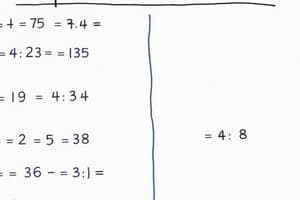Podcast
Questions and Answers
What is a related multiplication statement for the equation $540 \div 6 = 90$?
What is a related multiplication statement for the equation $540 \div 6 = 90$?
- $540 \times 6 = 90$
- $540 \div 6 = 90$
- $6 \times 90 = 540$ (correct)
- $90 \times 6 = 540$ (correct)
Is the number 364,545 divisible by 5?
Is the number 364,545 divisible by 5?
- Yes, as it ends with 5 (correct)
- Yes, since the last digit is even
- No, because it is an odd number
- No, only even numbers are divisible by 5
Which of the following options provides two factors of 20, excluding 1?
Which of the following options provides two factors of 20, excluding 1?
- 2 and 8
- 4 and 10
- 4 and 5 (correct)
- 2 and 10 (correct)
What classification best describes the number 100?
What classification best describes the number 100?
What is the prime factorization of the number 70?
What is the prime factorization of the number 70?
Which expression correctly uses exponents to represent $5(5)(5)(17)(17)$?
Which expression correctly uses exponents to represent $5(5)(5)(17)(17)$?
What is the first multiple of 8 that is also a multiple of 6?
What is the first multiple of 8 that is also a multiple of 6?
Which of the following are common factors of 6 and 8?
Which of the following are common factors of 6 and 8?
How many multiples of 9 are less than 100?
How many multiples of 9 are less than 100?
What is the factorization of the number 50 using prime numbers?
What is the factorization of the number 50 using prime numbers?
Which numbers is 364,545 divisible by?
Which numbers is 364,545 divisible by?
Which statement is true regarding the number 100?
Which statement is true regarding the number 100?
What is the prime factorization of the number 50?
What is the prime factorization of the number 50?
Which expression represents $5(5)(5)(17)(17)$ using exponents?
Which expression represents $5(5)(5)(17)(17)$ using exponents?
Which of the following numbers is LCF of 6 and 8?
Which of the following numbers is LCF of 6 and 8?
Which of the following shows the correct prime factorization for 70?
Which of the following shows the correct prime factorization for 70?
What is the LCM of the numbers 3 and 4?
What is the LCM of the numbers 3 and 4?
What is the GCF of the numbers 6 and 16?
What is the GCF of the numbers 6 and 16?
Which numbers are common multiples of 6 and 8 from the given lists?
Which numbers are common multiples of 6 and 8 from the given lists?
Which of the following shows the correct prime factorization for 50 using exponents?
Which of the following shows the correct prime factorization for 50 using exponents?
What are the first ten multiples of 8 in ascending order (smallest to largest) ?
What are the first ten multiples of 8 in ascending order (smallest to largest) ?
Which of the following is a common factor of 6 and 8?
Which of the following is a common factor of 6 and 8?
What is the result of dividing 282 by 23 with a remainder?
What is the result of dividing 282 by 23 with a remainder?
Flashcards are hidden until you start studying
Study Notes
Assignment Overview
- Practice Quiz 1.4 - 1.6 focuses on fundamental arithmetic operations.
- The quiz is a tool for assessment but does not affect overall grades.
- Due date is set for September 13, 2024, at 8:00 AM GMT-4.
Key Questions and Concepts
-
Division Problems:
- Example problems include division such as 1,677 ÷ 39 and identifying undefined results.
- Understanding how to write related multiplication statements, exemplified by 540 ÷ 6 = 90 leading to 6 × 90 = 540.
-
Divisibility Tests:
- Analyzing if 364,545 is divisible by numbers 2, 3, 4, 5, 6, 9, or 10 by selecting applicable options.
-
Factoring and Prime Numbers:
- Factoring numbers requires identifying two factors for numbers like 20, excluding the factor 1.
- Categorization of numbers as prime, composite, or neither, with 100 as a specific example.
-
Prime Factorization:
- Finding prime factorizations, such as those for the numbers 70 and 50, using exponents if possible.
-
Exponents:
- Writing expressions involving repeated multiplication using exponents, e.g., 5(5)(5)(17)(17) expressed as 5^3 × 17^2.
-
Multiples:
- Listing the first ten multiples of 8 to understand multiplicative patterns.
-
Common Factors and Multiples:
- Identifying common multiples and factors of 6 and 8, utilizing provided lists for answers in a comma-separated format.
Submission Details
- Answers are submitted by question parts, allowing for multiple revisions.
- Only the most recent submission for each part will count towards scoring.
Assignment Overview
- Practice Quiz 1.4 - 1.6 focuses on fundamental arithmetic operations.
- The quiz is a tool for assessment but does not affect overall grades.
- Due date is set for September 13, 2024, at 8:00 AM GMT-4.
Key Questions and Concepts
-
Division Problems:
- Example problems include division such as 1,677 ÷ 39 and identifying undefined results.
- Understanding how to write related multiplication statements, exemplified by 540 ÷ 6 = 90 leading to 6 × 90 = 540.
-
Divisibility Tests:
- Analyzing if 364,545 is divisible by numbers 2, 3, 4, 5, 6, 9, or 10 by selecting applicable options.
-
Factoring and Prime Numbers:
- Factoring numbers requires identifying two factors for numbers like 20, excluding the factor 1.
- Categorization of numbers as prime, composite, or neither, with 100 as a specific example.
-
Prime Factorization:
- Finding prime factorizations, such as those for the numbers 70 and 50, using exponents if possible.
-
Exponents:
- Writing expressions involving repeated multiplication using exponents, e.g., 5(5)(5)(17)(17) expressed as 5^3 × 17^2.
-
Multiples:
- Listing the first ten multiples of 8 to understand multiplicative patterns.
-
Common Factors and Multiples:
- Identifying common multiples and factors of 6 and 8, utilizing provided lists for answers in a comma-separated format.
Submission Details
- Answers are submitted by question parts, allowing for multiple revisions.
- Only the most recent submission for each part will count towards scoring.
Division Problems
- 1677 divided by 39 equals 43.
- 19456 divided by 64 equals 304.
- 282 divided by 23 provides a quotient of 12 with a remainder of 6.
Related Multiplication Statement
- For the division statement 540 ÷ 6 = 90, the related multiplication statement is 90 × 6 = 540.
Divisibility of 364,545
- The number 364,545 is divisible by 3 and 5.
- It is not divisible by 2, 4, 6, 9, or 10.
Factoring
- Two factors of 20 that do not include 1 are 4 and 5.
Prime Factorization
- Prime factorization of 70 is 2 × 5 × 7.
- Prime factorization of 50 is 2 × 5².
Exponents
- The expression 5 × 5 × 5 × 17 × 17 can be written using exponents as 5³ × 17².
Multiples of 8
- The first ten multiples of 8 are 8, 16, 24, 32, 40, 48, 56, 64, 72, 80.
Common Multiples
- The common multiples of 6 and 8 from the lists are 24 and 48.
Common Factors
- The common factors of 6 and 8 are 1 and 2.
Least Common Multiple (LCM)
- The LCM of 3 and 4 is 12.
- The LCM of 6, 21, and 30 is 210.
Greatest Common Factor (GCF)
- The GCF of 6 and 16 is 2.
- The GCF of 55 and 66 is 11.
Studying That Suits You
Use AI to generate personalized quizzes and flashcards to suit your learning preferences.




